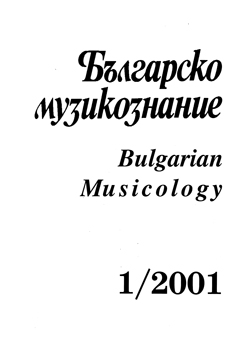Хорови и музикално-сценични традиции в културата на Пловдив: взаимни връзки и влияния (средата на XIX — края на XX в.)
Choral and Music Stage Tradition in the Culture of Plovdiv. Relations and Influences (from the mid-XIX c. to late-XX c.)
Author(s): Miglena TzenovaSubject(s): Music
Published by: Институт за изследване на изкуствата, Българска академия на науките
Summary/Abstract: Choral traditions in Bulgaria are ancient but they are still very much alive. The appearance of each of provincial musical theatres has depended largely on the existence of town choirs who, as a rule, included choral fragments from many operas in their repertoire. Even though the Plovdiv music stage art has a long tradition, the stable Plovdiv Operatic Theatre didn’t come into existence until 1953. The chorusmasters who perform choral fragments from operas with their students in schools are Angel Bukoreshtliev, Boris Kochev, Roman Spatarev and Marko Georgievich. The first Bulgarian Children’s Musical Medley was formed in Plovdiv. From 1905 to 1911 its founder, Dimo Boychev, presents operettas for children. In this way he stimulates the development of operetta composition in Bulgaria. Established back in 1896, the Plovdiv Choral Society, provided the funds and contri bution in-kind for several serious attempts to initiate opera theatre in the town. Such initiatives included: The Art Opera (1919), Native Song (1921), The Plovdiv City Op era (1922-1923), The Plovdiv Municipal Opera (1933), The Plovdiv District Opera (1940-1941) and The Sou/it-Bulgarian Opera (till 1944). The brightest figure in the. state-owned theatre was the chorus master Mr. Angel Christov. He transformed the opera chorus into the most important component of opera performances and, indeed, it was the policy of the theatre under him that the chorus contribution to the theatre repertoire was for more than that of soloists. This in turn was Angel Christov’s unique contribution to the Bulgarian choral and musical stage tradition and culture. The research under consideration highlights the fact that the Plovdiv theatre has staged “Antigona 43”, an opera by Lubomir Pipkov indicative of Bulgarian opera composition. The place of the chorus in Pipkov’s “Antigona 43” is compared to the one in Sophocles’ eponymous tragedy. The musical composition and the hidden massage of the choral input have also been analyzed. A sound record of soloists, chorus and orchestra of Plovdiv National Opera dating back to 1964 is also an object of this analysis.
Journal: Българско музикознание
- Issue Year: 2001
- Issue No: 1
- Page Range: 3-28
- Page Count: 26
- Content File-PDF

